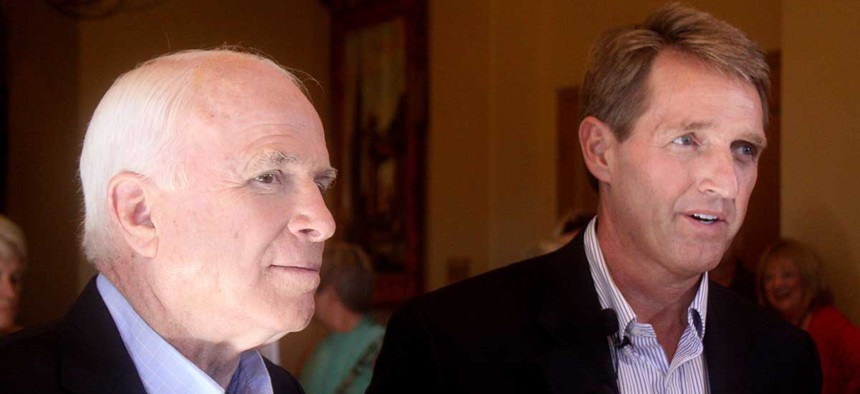
Republican Sens. John McCain and Sen. Jeff Flake of Arizona. Flickr user Gage Skidmore
Hillary Clinton’s Potential Senate GOP Partners
Here are some Republicans who could cross the aisle and work with a Democratic administration.
Set aside, for a moment, the last several years of Washington history, and envision a Democratic president and Republicans in the Senate who can actually forge a halfway decent relationship.
The case for why Hillary Clinton might be able to make progress on Capitol Hill is that she has a history of working with Republicans and would be open to forging new relationships. And her running mate, Sen. Tim Kaine of Virginia, says he could help. “I have very good relations with Republicans in the Senate,” Kaine told the Associated Press recently. “There’s some people who really want to get some good work done.”
The trick for Clinton would be identifying the small handful of Republicans willing to collaborate, and the key issues where compromise is possible. Some of the obvious choices are the party’s limited number of moderates, such as Sen. Susan Collins of Maine.
Here are eight other Republican senators whom she could target, and why.
Bob Corker. The Foreign Relations Committee chairman was a key player in the weird saga that unfolded over legislation to enable lawsuits by families of 9-11 victims against Saudi Arabia. The Senate overwhelmingly overrode President Obama’s veto in September, but Corker and many others also fear unintended consequences for the U.S.—and are hopeful that the measure can be altered. Clinton’s campaign has said she would have signed the bill. Still, negotiating changes can’t be ruled out, especially if some of the feared blowback—such as lawsuits against U.S. officials in other countries—starts to arrive.
Jeff Flake and John McCain. Clinton already has something in common with this pair: None of them support Donald Trump. Flake has always been a “Never Trump” guy; McCain yanked his backing after the tape surfaced of Trump bragging about sexually groping women without their consent. Looking forward, both could be important negotiators in revived efforts to move a sweeping immigration overhaul. McCain and Flake were members of the bipartisan “Gang of Eight” that steered a bill through the Senate floor back in 2013. Which brings us to another member of that gang…
Lindsey Graham. The South Carolina Republican never got on the Trump train either. He’s a potential ally for Clinton when it comes to Syria, where she has expressed support for a more interventionist policy than Obama has pursued. Both Graham and Clinton back establishment of a no-fly zone. Graham has praised Clinton over the years (though he criticized her during his failed White House run), and they worked together as part of a group that pushed legislation through the Senate to improve health care for members of the National Guard and Reserve.
Chuck Grassley. One of the big problems with the Affordable Care Act is that Congress can’t come together to fix problems with it. Republicans aren’t interested in helping Democrats make fixes to a law that they want to scrap. But with a Democratic presidency and time further cementing the law, some Republicans might be willing to soften their party’s posture. Grassley told Morning Consult recently: “As a practical matter, our Constitution requires you to work with the president, even if you disagree with them.” The Judiciary Committee chairman is also a key backer of bipartisan criminal-justice-reform legislation, which brings us to another backer of that bill…
Mike Lee. The Utah Republican, another Never Trump-er, has put a lot of work into building consensus on criminal-justice reform. But Lee and others were unable to convince Majority Leader Mitch McConnell to bring up bipartisan legislation to reform sentencing laws for nonviolent drug offenders and help ease prisoners’ transition back into society. Clinton, too, has made criminal-justice reform a priority issue.
Lamar Alexander. The chairman of the Health, Education, Labor, and Pensions Committee has experience with the days when cooperation was a more common thing. And even in the present era, he worked with Democratic Sen. Patty Murray on the bipartisan 2015 overhaul of No Child Left Behind that Obama signed late last year. Elsewhere, bipartisan medical-innovation legislation on both chambers, an initiative the Tennessee Republican has helped to steer, could be revived next year if it doesn’t cross the finish line in the lame duck.
John Barrasso. He’s likely to chair the Environment and Public Works Committee if Republicans hold onto the Senate. The Wyoming Republican would be poised to be a key player in the big infrastructure package that Clinton will make an early priority. Barrasso, to be sure, is often a partisan brawler as head of the Republican Policy Committee. But he’s not averse to big infrastructure measures per se—he voted for huge transportation and water-infrastructure measures in the current Congress.
(Image via Flickr user Gage Skidmore)







